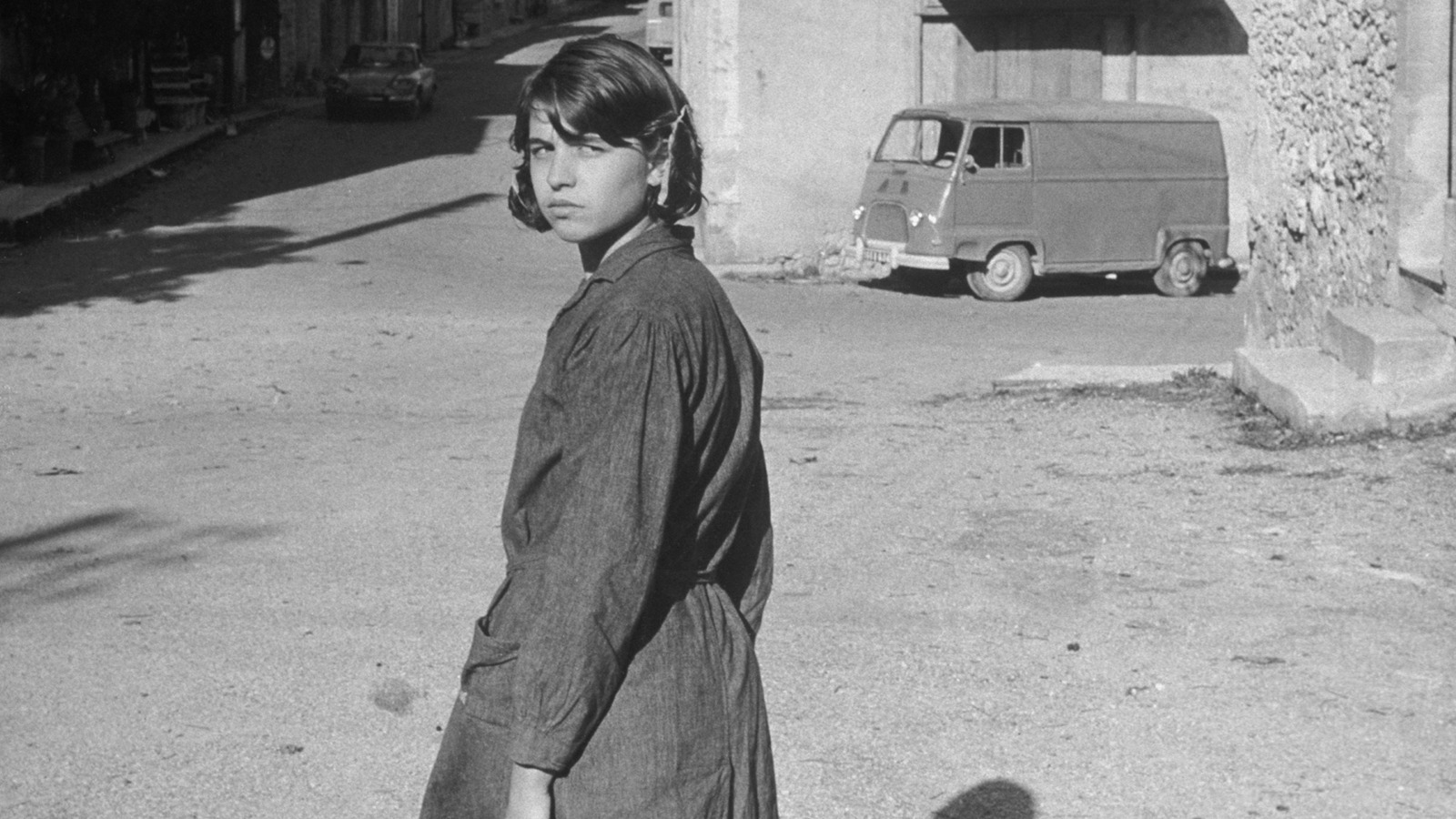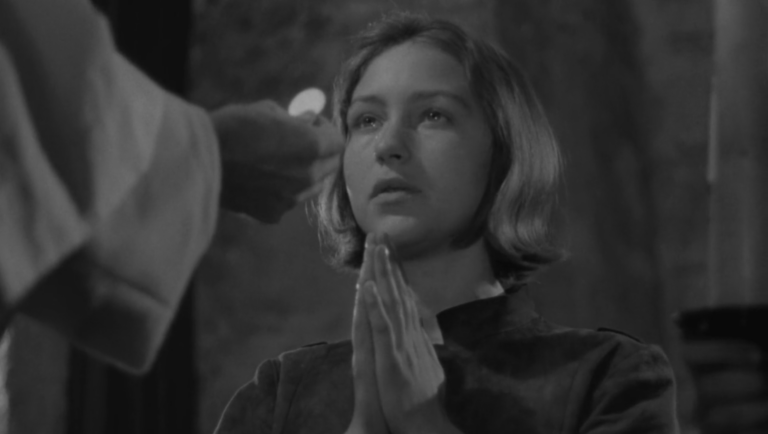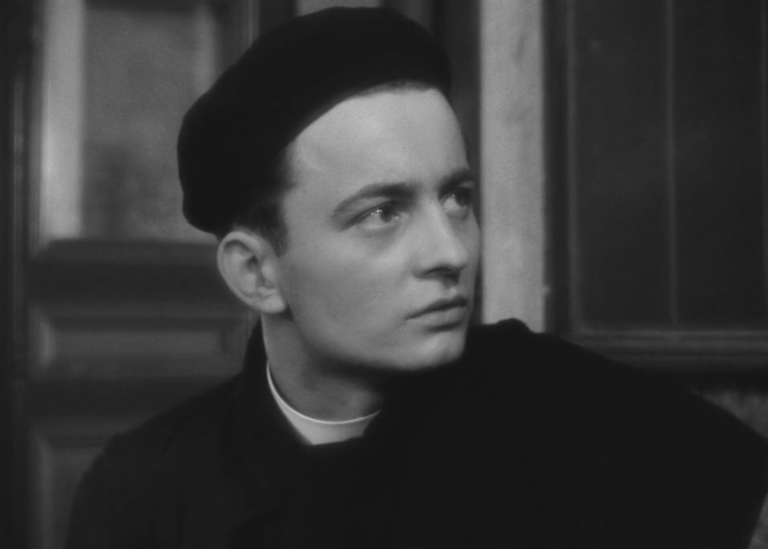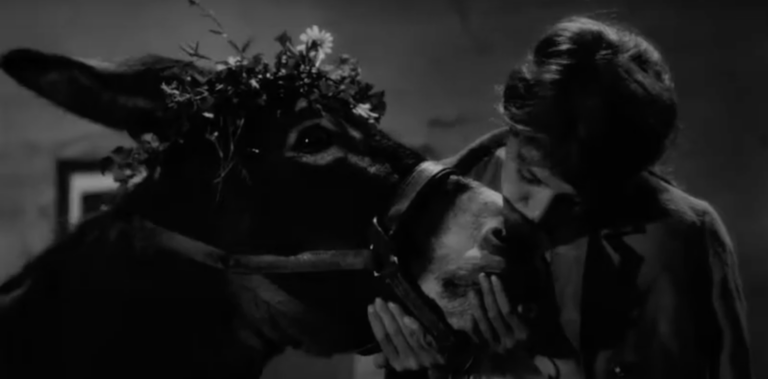Mouchette is perhaps the most afflicted protagonist in all of Bresson’s films. She’s slapped, bullied, sexually taunted, raped, slut-shamed, and yet, she is still a girl and not made out to be a bearer of the cross. In Au Hasard Balthazar, when Marie is left to crouch with her naked front to the wall, there’s a heightened sense of shame in the way Bresson frames the scene; we see her invasively through fragmented glass. However, when Mouchette is raped by Arsène, we see her struggle only to acquiesce. Once the embraced ordeal is over, she walks away towards her house, unseen with wet clogs. She’s shaken, but largely unsurprised; she has come to expect this from her boorish town. Sporting the rebel’s mantle next dawn, she walks through the gamekeeper’s fields and sees pheasants being hunted. Playing the dice, she rolls down thrice to see if salvation has a place for her. It does, and she’s welcomed with open arms – but for the viewer, her decision is sudden and shocking. The death of spirited rebellion never betrayed traces of anguish, but isn’t that what one comes to expect of Bresson?
He believed that his cinema inheres to show what human beings conceal rather than reveal. In this sense, he succeeded the most with A Man Escaped, but he pushes beyond the threshold of understanding and into the realm of sensing with Au Hasard Balthazar and Mouchette, two films that followed in quick succession. When Fontaine drops his scraping spoon and beats a hasty retreat to his bed, it’s evident and understandable that a guard is nearby. When Mouchette hears bullets rain down beside her, there’s an apotheosis of disgust building within her for the world that makes the tranquil floors of the pond seem far more appealing. Here, this access of emotion isn’t readily comprehensible, but one senses it in the aftermath.
With time, Bresson’s focus has inverted – and this might serve to explain the emerging causal relationship that his protagonists develop with the world. In both The Diary of a Country Priest and A Man Escaped, an internalization of focus abounds. We see the concealed skirmishes of the soul as Fontaine wrestles against self-doubt; the world is reduced to four walls to isolate his tug-of-war with himself. Surrounded by damp walls, there is only one concern – or rather two – for the men inside them. They must, at all costs, surmount the self-doubt that presents them with two options – perish or persist. In Late Bresson, the choices are no longer one-dimensional; Marie and Mouchette, and even Targe from L’Argent, are each faced with a multitude of avenues that either demand a step forward or backward. The focus is then concave and less convex, branching out to externalize.
Seen through the concave, the landscape of Mouchette is among the most depraved in Bresson’s films. So much so, that had another filmmaker set out to make a film based on Bernanos’s novel, the young girl would have been a plaster saint. An alcoholic contraband smuggler as a father, an incapacitated mother, an exacting schoolmistress, and a milieu that either sexualizes her or priggishly judges her. When she sings, held against the piano keys by her schoolmistress, she sounds angelic in her rendition. She bears the weight of filth piled upon her, and the few reprieves she gets through dodgem cars and a shopkeeper’s short-lived kindness are sufficient to tune the tonalities of the film to be a tear-jerking tale of Christian callousness. But that would do only one of two things – make her death seem righteous or demonize the world that pushed her into the pond. For Bresson, both are easy exits. He is a man of faith, though he doesn’t abnegate the will of the human spirit. He brokers an in-between; the tribulations of Mouchette are subjected to a removed glance while the insouciance of the world and its institutions is brought out without derision. Suicide isn’t a graceful exit, nor is it a sin. She isn’t impelled, but it isn’t deniable that there wasn’t a compulsion.
More than what it offers to one as a pensive observation, the final scene of suicide is also a new turn for Bresson. In what Roberto Polito describes as an oblique sound-image design, I also soon realized a new shift in the spatial-aural interchanges that earmark Bresson’s style. As Mouchette rolls ungainly towards the pond and falls into its depths, the frame is vacated. We see the splash and its recession as an indicator of morbid peace. The Magnificat plays too, but this brought to my mind the same phenomenon that takes place in L’Argent; we see the crowd prise their necks to ogle at the place that Targe has now left, frog-marched out of it by the police. As they walk away, only receding footsteps are heard. All of this indicates that with age, Bresson appreciated sound more than sight. He affirmed this in his Notes from the Cinematograph and even jibed at reporters that he’d like to make a film only with sound. In Mouchette, the scene that arrested me the most with its use of sound is perhaps when Mouchette returns to her house to find the baby and her mother left unattended. We see her tend to them, with a cacophony of clinking china and the restless cries of infancy. Occasionally, we hear a truck roar across the silent night, and it soon creates a pattern. Earlier in the film, we see her father return, heralded by the upbeat motor. He continues to drive like a creature of habit in bed, holding his beret as the wheel. This minor association is utilized in a sort of aurally foreboding Chekhovian effect when Mouchette, later than ever in her return, comforts her mother and her sister with trucks in the backdrop.
Moreover, the most noticeable change in this spatial-aural interchange is its order. In Early Bresson, sight had precedence over sound. In A Man Escaped and Diary of a Country Priest, Bresson populates the screen with a deluge of inserts that display contraptions of escape – physical in the former, and metaphorical (notes) in the latter – used by Fontaine and Monsieur Curé. After their exposition, he follows it up with a human face, which in most cases is that of the protagonist. The suggestiveness of this is to isolate an emotion; for both Fontaine and Monsieur Curé, it’s doubt, but the word earns different meanings in their respective contexts. Late Bresson’s style flips this – sight precedes sound. It moves, or rather expands, from a concentrated yet intangible sensation to an expansive yet invisible vista of emotion, as when Mouchette falls into the pond, or when her mother walks out of the chapel. There’s much more to be sensed in the ambiguity of sound and steeping silence.
Mouchette is a marvel, for it achieves a balance between heresy and devotion as well as sight and sound. With only one undivided centre of focus, it captures the absurd social fabric that the Post-War countryside experienced more than Au Hasard Balthazar. This is not to place the two against each other, but rather side-by-side. It’s as if Mouchette could well be Marie, with her tribulations here and that of Balthazar there, but such was not the case. Regardless, let us appreciate what has transpired to give us a tale where even dogged perseverance to live is scuppered by a society lost in its ways.





